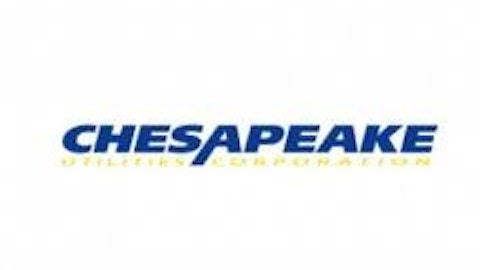Recently, Chairman and CEO Tom Ward of SandRidge Energy Inc. (NYSE:SD) was fired from the company he founded. The CEO position was taken over by James Bennett, the company’s CFO, and the Director Jeffrey Serota was the interim chairman. Since the beginning of the year, SandRidge Energy’s share price has dropped significantly, from $6.35 per share to around $4.80 per share. Is the recent CEO’s exit a good signal for the company’s upside potential? Let’s find out.
SandRidge should be worth $12-$14 per share
SandRidge has been the target of shareholder activism from one of its biggest shareholders, the hedge fund TPG-Axon Capital. In a letter to SandRidge Energy Inc. (NYSE:SD)’s Board of Directors in November 2012, TPG-Axon pointed out that the poor performance of the company was due mainly to three reasons. First was the incoherent, volatile and unpredictable management strategy. Second was the irresponsible spending and poor strategic planning, leading to the high cost of capital and massive dilution for the company’s shareholders. Third was the poor corporate government, which did not match the interests of management and shareholders.
TPG-Axon said that the current share price underestimated the company’s intrinsic value. It estimated the fair value of the company to stay in the range of $12 to $14 per share, around three times higher than the current trading price. In order to unlock the potential hidden value of the company, TPG-Axon would like to have its people on SandRidge’s board. Moreover, it urged the company to replace CEO Tom Ward and bring in new management. It also suggested SandRidge Energy Inc. (NYSE:SD) to explore all strategic alternatives including asset sales.
It is quite cheap on the EBITDA multiple basis
In March, SandRidge Energy Inc. (NYSE:SD) reached a deal with TPG-Axon, agreeing that the board had to either remove Tom Ward from the CEO position by June 30 or TPG-Axon would have the controlling number of seats in the company’s board. At the current moment, TPG-Axon already has four directors on the 10-member SandRidge’s board. Interestingly, Fairfax, with a 12.7% stake in the company, had supported Tom Ward to fight against TPG-Axon.
SandRidge had around 367 million BOE in proved reserves, with oil representing around 46% of its total proved reserves. In the full year 2013, the company expected to spend $1.45 billion on capital expenditure, including $970 million in drilling and completion, $185 million in infrastructure and work-overs, and more than $200 million in land and seismic and oil field services. Most of the capital expenditure, more than $1 billion, will be spent in the Mississippi region. SandRidge Energy Inc. (NYSE:SD) is trading at $4.80 per share, with a total market cap of nearly $2.3 billion. The market values SandRidge at only 2.62 times its trailing EBITDA.
Shareholder activisms in both Chesapeake Energy Corporation (NYSE:CHK) and Hess Corp. (NYSE:HES)
Tom Ward was the co-founder of Chesapeake Energy Corporation (NYSE:CHK) with Aubrey McClendon. Interestingly, Chesapeake Energy has also been facing shareholder activism from several investors including Carl Icahn, Mason Hawkins and Paul Tudor Jones. Chesapeake is considered to be the second largest natural gas player in the U.S., having nearly 15.70 tcfe in its total proved reserves. Chesapeake Energy Corporation (NYSE:CHK) has been unlocking shareholder value by divesting several non-core assets. The company said that it has already signed $2 billion of asset sales since the beginning of the year. Chesapeake Energy Corporation (NYSE:CHK) announced its goal of divesting $4 – $7 billion worth of assets within 2013. It is trading at around $19.50 per share, with a total market cap of around $13 billion. The market values Chesapeake Energy Corporation (NYSE:CHK) much higher than SandRidge, at 5.82 times its trailing EBITDA.
Another big energy player, Hess Corp. (NYSE:HES), has been faced with shareholder activism. One of the company’s biggest shareholders, Elliott Management, with a 4.5% stake in the company, thought that Hess could be worth as much as $126 per share, around two times higher than its current trading price of $64.30 per share. Elliott had recommended Hess Corp. (NYSE:HES) do three things to unlock the company’s potential value: (1) spin off Bakken, Eagle Ford and Utica areas; (2) divest the downstream assets and turn its midstream assets into MLP or REIT; and (3), streamline the remaining international portfolio. In the middle of May, Hess and Elliott Management reached an agreement to end the proxy fight, adding Elliott’s three board seats to Hess Corp. (NYSE:HES)’s board in exchange for Elliott’s support of the company’s slate of five directors. Looking forward, with three board seats, Elliott could be given more strength to follow its plan, and unlock the hidden potential value of this global energy company. Hess Corp. (NYSE:HES) is also quite cheaply valued, at only 3.4 times its trailing EBITDA.
My Foolish take
All three energy companies could be considered good opportunistic plays on shareholder activism. As all three companies have quite valuable oil/gas assets and they are quite cheaply valued on the market now, they could fit in the long-term portfolios of patient investors.
Anh HOANG owns shares of Chesapeake Energy and Hess. The Motley Fool has the following options: Long Jan 2014 $20 Calls on Chesapeake Energy, Long Jan 2014 $30 Calls on Chesapeake Energy, and Short Jan 2014 $15 Puts on Chesapeake Energy.
The article Three Opportunistic Energy Plays on Shareholder Activism originally appeared on Fool.com.
Copyright © 1995 – 2013 The Motley Fool, LLC. All rights reserved. The Motley Fool has a disclosure policy.




